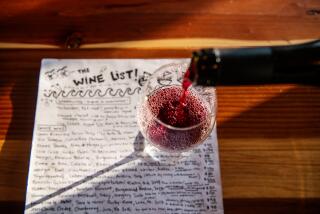Wine lovers, beware: Those cranberries have a killer instinct
- Share via
It’s a problem that rears its ugly head only at holiday time: The cranberry is a born killer of good wine. Most wines, when confronted with sweet-tart cranberry sauce, beat a hasty retreat, flattening out or turning thin and bitter.
One reason, says Susan Ebeler, a professor of flavor chemistry in the viticulture and enology department at UC Davis, is that cranberries are very high in polyphenolics, the chemical compounds that contribute to flavor and aroma, and they tend to be very astringent. “Wine is high in similar compounds,” she says. “It may be that you’re getting a carry-over effect that intensifies the reaction.”
At the same time, she says cranberries are very high in acid, which could have the effect of emphasizing the bitter aspect of wine flavor.
So what’s a wine lover to do?
Well, you could skip the cranberry sauce (we did, in our Thanksgiving menu).
But to see if anything could work, we sacrificed a rack of wine -- a Sauvignon Blanc, a Chardonnay, an off-dry Riesling, a Grenache rose, a Pinot Noir, a Beaujolais Villages, a Merlot, a Tempranillo, a Syrah, a Cabernet and a Zinfandel -- tasting each with a standard batch of cranberry sauce.
The cranberry sauce demolished most of them. The Riesling intensified a nasty cranberry aftertaste. The rose was overpowered. The Beaujolais? Sour and metallic. The Pinot went flat, and even the mighty Zin turned bitter.
Curiously, the Chardonnay, one of those really oaky Californians, held its ground. So did the Tempranillo.
But the winner was the Merlot. It came through surprisingly soft and drinkable, almost unscathed.
More to Read
Eat your way across L.A.
Get our weekly Tasting Notes newsletter for reviews, news and more.
You may occasionally receive promotional content from the Los Angeles Times.








